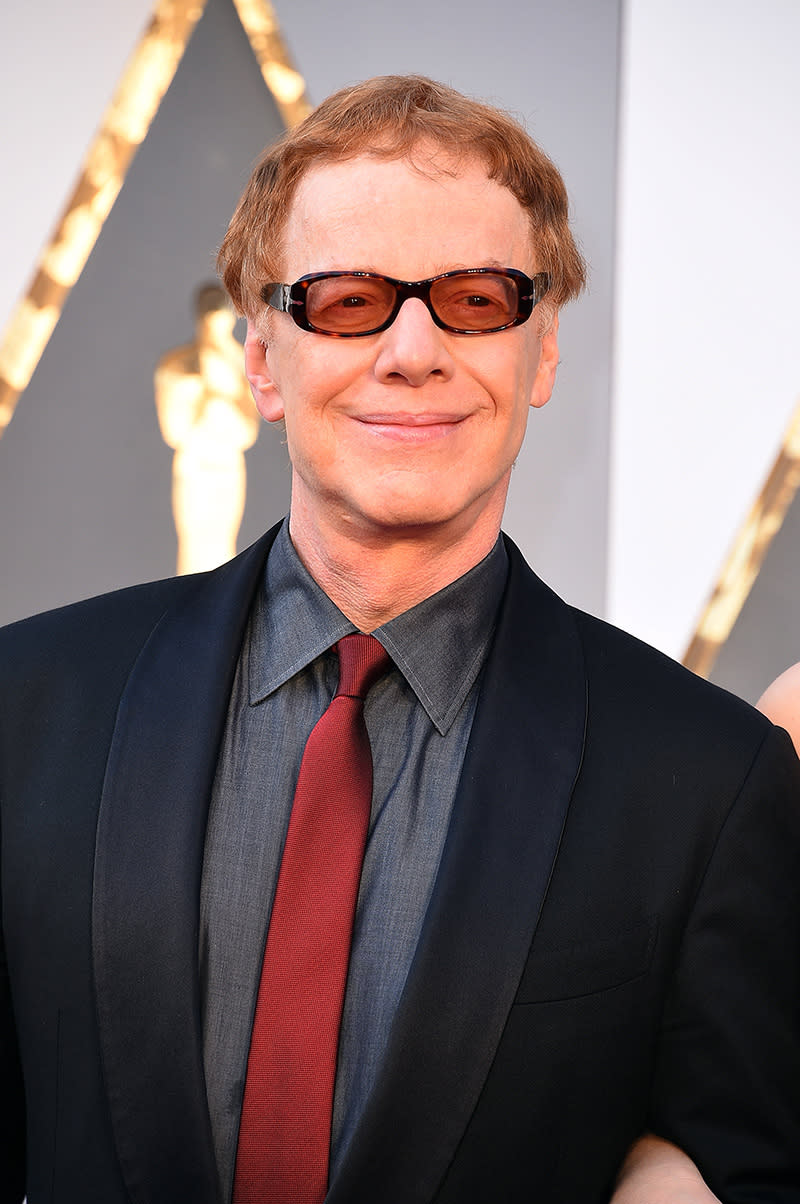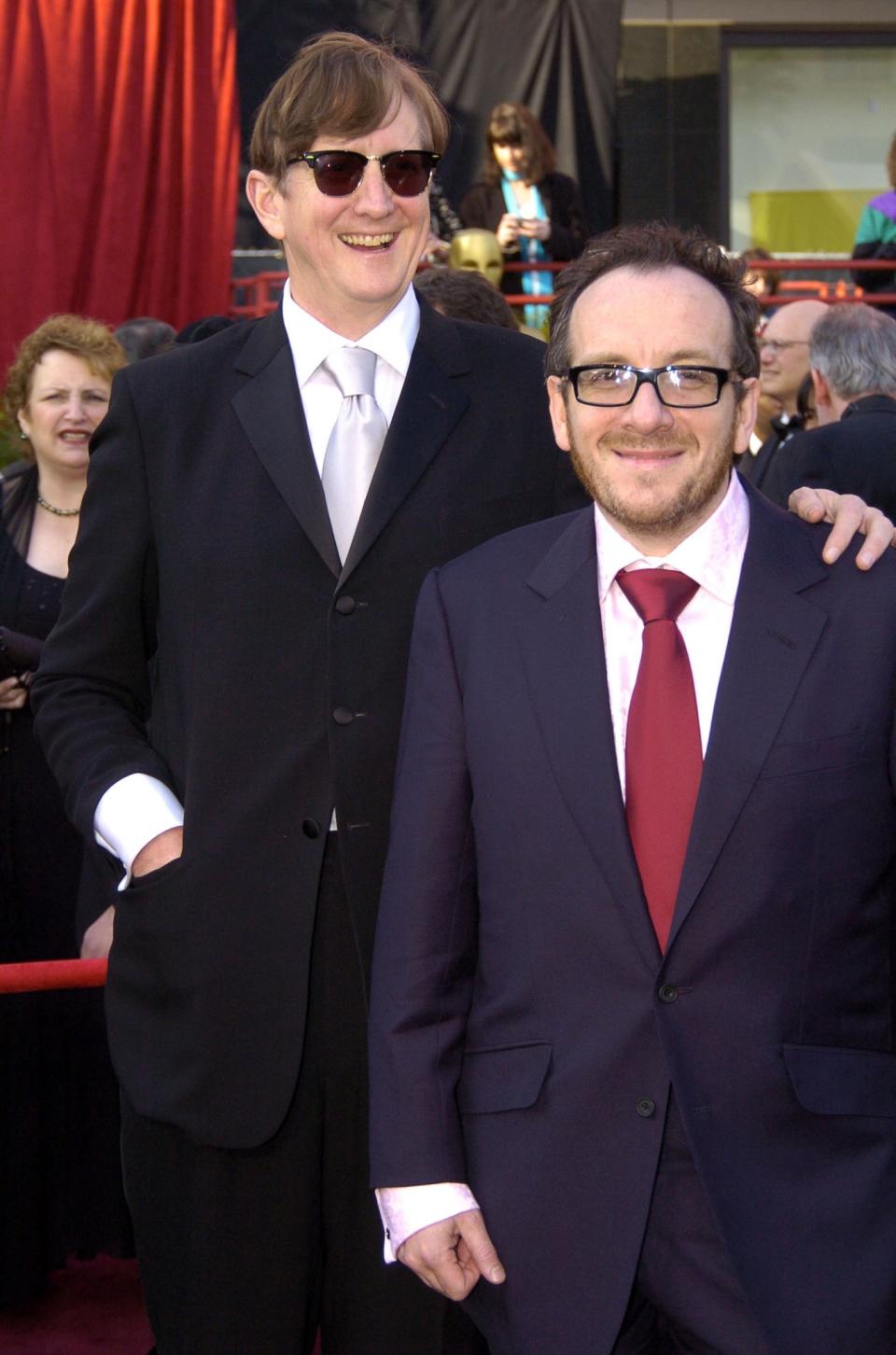Great alternative rock moments in Oscar history

When most of us think of the music of the Oscars, we think big, blowhard ballads by Céline Dion, Phil Collins and Diane Warren, bombastic scores by John Williams, or Rob Lowe’s duet fail with Snow White. But actually, when it comes to music, the Academy Awards are occasionally cooler than the Grammys and VMAs. For instance, this year the frontrunner for Best Song is Lady Gaga and Bradley Cooper’s “Shallow,” which was actually co-written by Mark Ronson, Andrew Wyatt (of electropop trio Miike Snow) and Anthony Rossomando (of the British garage bands Dirty Pretty Things and the Libertines). Another 2019 nominee in that category is “When a Cowboy Trades His Spurs for Wings” from The Ballad of Buster Scruggs, penned by Americana darlings David Rawlings and Gillian Welch.
Ahead of this Sunday’s very musically driven Oscars, here is a look back at the hippest indie-rock musical moments in Academy Awards history, from Björk’s swan dress to Elliott Smith’s moment of underdog good will.
1988: Ryuichi Sakamoto, founder of the pioneering Japanese electronic group Yellow Magic Orchestra, and Talking Heads’ David Byrne win the Best Original Score Academy Award for their work with Chinese composer Cong Su on The Last Emperor. (In related but slightly less indie news, the award was presented by the stars of Dirty Dancing.)
1996: The Merseybeat-inspired ditty “That Thing You Do!” — written by Fountains of Wayne’s Adam Schlesinger and featuring Mike Viola (formerly of powerpop band the Candy Butchers) on lead vocals — is nominated for Best Song. It predictably loses to Madonna’s Tim Rice/Andrew Lloyd Webber-penned Evita ballad “You Must Love Me,” but two decades later, we’re still in love with this slice of ’60s-stylized pop.
1998: Elliott Smith, a genius songwriter who first came to underground fame as the co-founder of the Portland alt-rock band Heatmiser before striking out on his own, gets his big break when fellow Oregon indie icon Gus Van Sant enlists him to contribute six songs to the soundtrack of Good Will Hunting. This unusual partnership — which takes place in an era long before hip soundtracks (think Garden State, Twilight) are the norm — is likened by critics to Simon & Garfunkel’s iconic soundtrack for The Graduate. One of Smith’s Good Will Hunting songs, “Miss Misery,” becomes the underdog Best Song nominee at the 70th Oscars, and while Smith, of course, loses to Céline Dion’s Titanic megahit “My Heart Will Go On,” his vulnerable, understated, rumpled-suited performance is a truly special pop-culture moment. Tragically, Smith dies five and half years later, at age 34.
1998: Danny Elfman, the onetime frontman for seminal L.A. new wave group Oingo Boingo, receives his first two Oscar nominations, in the same year — Best Original Dramatic Score for Good Will Hunting, and in the short-lived category Best Original Musical or Comedy Score for Men in Black. Incredibly, he tells Yahoo years later, when discussing his first foray into film composing for Pee-wee Herman’s Big Adventure: “Honestly, I didn’t even think it’d ever be more than just one movie. I thought it was a fluke. I couldn’t even fathom what I’d be doing in 10 years, let alone 30.” Elfman goes on to nab two other Oscar nominations.

2000: “Save Me,” a sumptuous and melancholy ballad penned by onetime ‘Til Tuesday new-waver-turned-serious singer-songwriter Aimee Mann for Paul Thomas Anderson’s Magnolia, is up for Best Song.
2001: Björk’s “I’ve Seen It All” from Lars von Trier’s Dancer in the Dark (which also stars Björk) is up for Best Song. She doesn’t win, but her swan dress, by Macedonian designer Marjan Pejoski, becomes one of the most memorable outfits in Oscar history. (Indie bonus points that Bjork’s performance is introduced by Winona Ryder.)
2004: T Bone Burnett and Elvis Costello’s Cold Mountain song “Scarlet Tide” receives a Best Song nomination, ultimately losing out to the very worthy and equally legendary Annie Lennox.

2008: Ex-Frames founder Glen Hansard and partner Markéta Irglová, aka the Swell Season, win Best Song for “Falling Slowly,” from the charming Irish indie film Once. When Irglová’s acceptance speech gets cut off, host Jon Stewart saves the day by bringing her back onstage so she can finish. It’s one of the sweetest, and indie-iest, Oscar moments ever.
2009: “O… Saya,” co-written by A.R. Rahman with English-Tamil rapper/electro-indie artist and activist M.I.A., receives a Best Song nod.
2010: Americana troubadour Ryan Bingham and legendary roots-rock producer T Bone Burnett take home Best Song honors for the Crazy Heart theme “The Weary Kind.”
2011: Nine Inch Nails’ Trent Reznor wins Best Original Score for his work on David Fincher’s The Social Network with Atticus Ross. The industrial/alt-rock icon seems as surprised, and delighted, as his fans.

2011: The Smiths’ guitarist Johnny Marr, also known for his work with Electronic, The The, Modest Mouse, the Pretenders, Noel Gallagher and the Cribs, is nominated for his work on Hans Zimmer’s Inception soundtrack.
2012: The Muppets’ movie theme “Man or Muppet,” written by Bret McKenzie of New Zealand indie comedy-folk duo Flight of the Conchords, wins Best Song, beating out Sergio Mendes and Siedah Garrett.

2014: The Spike Jonze-directed Her picks up two musical nominations: for Best Score for composers Will Butler (of Arcade Fire) and Owen Pallett, and for Best Song for “The Moon Song,” by the Yeah Yeah Yeahs’ Karen O. Karen loses to the ubiquitous “Let It Go” from Frozen, but she gets to perform a sweet and majestic duet at the Oscars with Vampire Weekend’s Ezra Koenig.
2015: In probably the coolest Oscars musical moment ever, “Everything Is Awesome” from The Lego Movie is a Best Song nominee; the song was originally co-written by the Lonely Island, produced by Devo’s Mark Mothersbaugh, and recorded by Tegan and Sara. The 87th Academy Awards’ televised performance features all of these artists, along with Questlove, Will Arnett dressed as Batman, keytars, and a menagerie of seemingly Flaming Lips-inspired furries. Everything about this is awesome, indeed.
2015: Reclusive New Radicals mastermind Gregg Alexander receives a Best Song nod for his co-write for Begin Again, “Lost Stars.” Both “Lost Stars” and “Everything Is Awesome” lose to worthy (and much more serious) contender John Legend and Common’s “Glory,” from Selma.
2016: Anohni, formerly Antony Hegarty of the Mercury Music Prize-winning Antony & the Johnsons, becomes the first transgender performer ever nominated for an Oscar, for co-writing Best Song contender “Manta Ray” from the ecocide documentary Racing Extinction. What makes this a not-so-great moment in indie-rock Oscar history, however, is that Anonhi is not invited to sing on the telecast. She writes a scathing essay explain her decision to not attend the awards at all, not even to walk the red carpet, saying: “Like global warming, it is not one isolated event, but a series of events that occur over years to create a system that has sought to undermine me, at first as a feminine child, and later as an androgynous transwoman. It is a system of social oppression and diminished opportunities for transpeople that has been employed by capitalism in the U.S. to crush our dreams and our collective spirit…. I will not be lulled into submission with a few more well manufactured, feel-good ballads and a bit of good old fashioned T. and A. They are going to try to convince us that they have our best interests at heart by waving flags for identity politics and fake moral issues. But don’t forget that many of these celebrities are the trophies of billionaire corporations whose only intention it is to manipulate you into giving them your consent and the last of your money.”
2017: Eleven-time Best Score Oscar nominee Hans Zimmer, who won in 1995 for The Lion King, is booked to play the music from his films at the Coachella festival and owns the weekend.
2018: Sufjan Stevens, Radiohead’s Jonny Greenwood and Dustin O’Halloran of the dreampop band Devics all receive Best Score nominations. Stevens will perform at that year’s Oscars ceremony.
Read more from Yahoo Entertainment:
A fond farewell: Remembering Elliott Smith, 15 years after his tragic and mysterious death
These scandalous Oscars looks by Cher, Charlize, and Björk are unforgettable
Follow Lyndsey on Facebook, Twitter, Instagram, Amazon, Spotify
